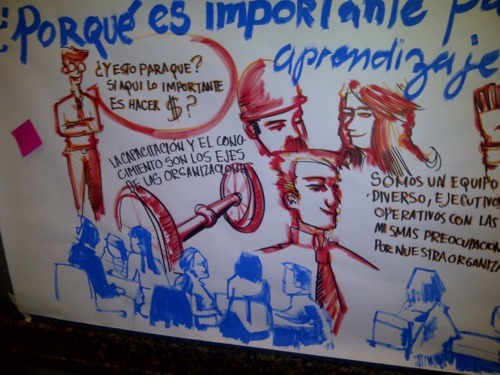The 5th Knowledge Management & Organizational Learning Summit held over 2 days attracted 200+ many of whom booked late. Colombians I was told leave most decisions such as where to go on holiday until the last minute which places a premium on contingency planning. Perhaps unsurprisingly given the country is emerging from a difficult period personal financial decisions are driven by short-term expediency rather than long term accumulation of wealth. This translates into ‘knowledge is power’ mentality that makes efforts to promote the sharing of knowledge a challenge.
Despite being the sole European and linguistically challenged I nevertheless felt part of a family. My presentation delivered in English with simultaneous translation was given to an audience of bankers, industrialists and government officials. The hour I spent in advance going through the presentation with Carolina the interpreter paid off handsomely and enabled me to run in tandem with Luisa Sucre (an excellent facilitator from Venezuela) a number of interactive sessions that revealed how good South Americans are at dialogue.
I began by asking how many had been in km for more than 5 years – about 1/3rd. How many had km in their title – about 1/5th and how many thought km had been around for more than 10 years – about 2/3rd. This was a topic they’d clearly thought about even if it had not become an accepted discipline in the organizational hierarchy.
I was also able to garner a dozen varying views on the role of the future knowledge manager in Colombia – more of that in a subsequent posting. The allotted 2 hours flew by (at least for me); I wished I’d had longer.
The afternoon of Day Two featured a World Café run by Zulma Sofia Patarroyo a very energetic Colombian who used the 3 hour session to surface what the delegates had learned and would take away from the event. She began by asking each table of four to listen to each other’s learning points and then for the table ‘host’ to remain while the other three found an alternative table. This continued for a further 2 ½ hours which seemed like an eternity to some but was enthusiastically embraced by most as I was to see evidence of the following day when meeting a delegate who had his ‘takeaways’ on the wall of his office. Jorge Enrique Merchan a graphic artist was on hand to expertly record the activities.

My personal takeaways:
— A very well organized event that covered the little details well and didn’t try and pack too many speakers into the two days
— The audience was attentive and respectful; it took little prompting to get them to participate in a karaoke style community singing at the start of Day Two led by Maria Helena Magalhaes from Brasil, creating music at the end of Day One with Patricia Molla from Argentina and embracing the World Café concept with abundant enthusiasm; laughter is always near the surface of conversations
— There is a lot of km style activity going on in South America albeit under other labels especially Organizational Learning; people see its potential value
— The big issues organizations face are similar to those found everywhere and include knowledge retention and knowledge transfer though here perhaps more than anywhere there is a need for a structured contextual approach in order to gain endorsement across an organization
— The use of stories to drive change and underpin initiatives is in its infancy
— A visit to the Botero Museum where much of Fernando Botero Angulo’s work is displayed in a remarkably open manner should be an essential component of any trip to Colombia
